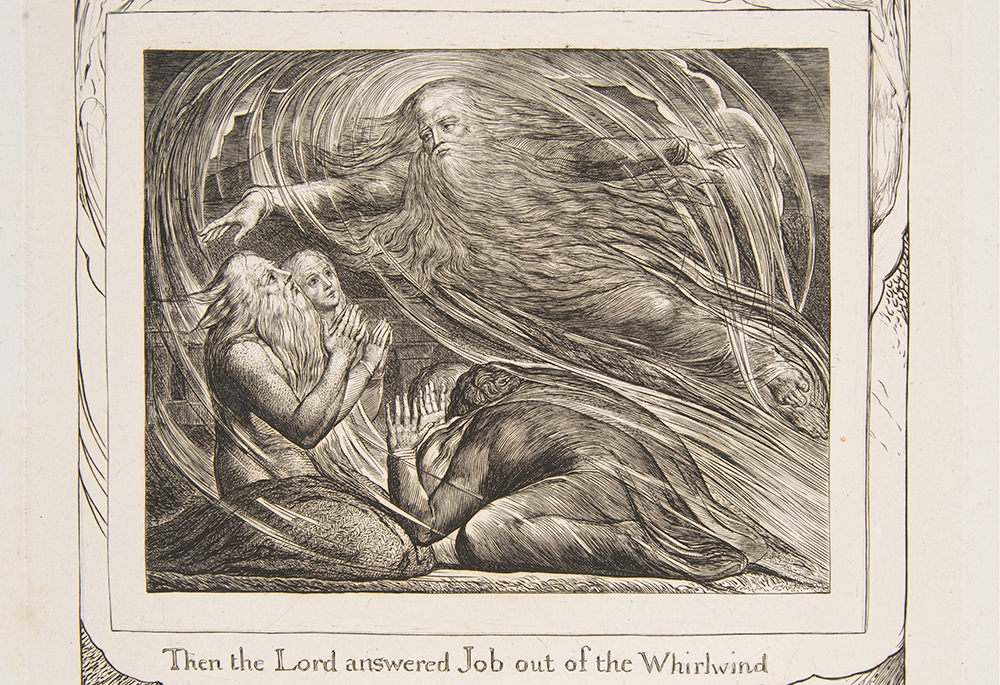
"The Lord Answering Job Out of the Whirlwind," an 1825-26 engraving by William Blake (Metropolitan Museum of Art)
Lots of people complain — and figure they've got good reason to do so. But who can compare to Job? When God bragged about how good Job was, Satan replied that it's easy to be good when everything goes your way — when you have a secure home, a good family and a wonderful reputation. Who wouldn't thank God for all of that? But, what happens when it all falls apart through no fault of your own? That was Satan's gamble — let Job lose it all, and then see what he thinks of God!
Suddenly bereft of everything that had given him identity and purpose, Job finds life a drudgery. He can identify with people with no pride in their work as they gain a poor salary, never feeling that they are contributing to the world or expressing themselves through their labor. Growing old, Job's life has lost its meaning and his friends, insisting that he must have deserved his misfortune, only make it worse. This is where we meet Job today.
Although few knew anything like Job's abundance of loss, the people of Jesus' day, like many today, shared Job's sense of drudgery, wondering if the God of justice had fallen asleep. When Mark describes the Galilee where Jesus began preaching, it seemed that demons were overpowering the population and that a good number of those who weren't possessed were in need of healing. No wonder Jesus started out like a whirlwind! Mark's first chapter tells us that Jesus was baptized and went to the desert to return and immediately began to teach, call disciples, exorcize demons and heal the sick. (He performed his first healing miracle, the restoration of Peter's mother-in-law, right after the Sabbath ended — showing that God was active among the people, no matter how wretched they felt.)
Mark, whose narrative invented the genre of Christian Gospels, gave his work the title, "The beginning of the Gospel." He wanted his readers to know that the times were changing — and quickly.
Jesus announced the change and he himself was the change. But, as Mark's title implied, what Jesus did was just the beginning. He was no Superman, flying in and pulling people out of danger all by himself. From the get-go, he called disciples, either by inviting them to follow him, or, as in the case of Peter's mother-in-law (let's call her Amatallah, which means "servant of God"), by restoring their ability to serve God and neighbor.
The point of all his activity was to embody the message he preached: "This is the time of fulfillment, the reign of God is at hand, believe it and act like you believe it!" When people began to take his message seriously, it snowballed and became a self-fulfilling prophecy. The more people believed that God's reign was at hand, the more they recognized it and spread it.
Paul puts this into the imperative as he writes to the community at Corinth. Speaking for himself, he says that knowing the Gospel impels him into mission. "Woe to me if I do not preach it!"
Paul offers a counterpoint to Job. Whereas Job tried to understand his sorry lot, Paul leads his readers to see beyond the tragedy — to see that preaching the crucified Christ proclaims not only God's definitive victory over all the powers of destruction but gives meaning to every moment of life (1 Corinthians 1:18-25). Thus Paul, like Amatallah, is free to serve others. Their service and preaching becomes sacramental; it accomplishes what it signifies, bringing the reign of God into greater fruition.
Advertisement
In his lifetime, Job complained mightily to God, demanding an answer to the injustice of life. When God finally answered him, all Job could do was admit that God's ways were beyond his comprehension (Job 38-40). The restoration of Job's fortune does not answer the question of suffering, nevertheless, it points to Christ and the resurrection, God's definitive response to evil.
Today we might not be very different from Job and Paul. We see innocent suffering in so many parts of our world and feel helpless to respond. It seems that evil and violence have the upper hand. But, if we can, like Paul, give ourselves over to belief in the Gospel, we can enter into the sacramental dynamic of the self-fulfilling prophecy that is the reigning of God.
Job would tell us, "Beware! Feel free to complain, to lament, to interrogate God, but know that you do so at great risk." We never know when God will appear out of the whirlwind and give us a mission beyond our wildest dreams. A mission that will eliminate drudgery from our vocabulary, a mission for which we were made.
